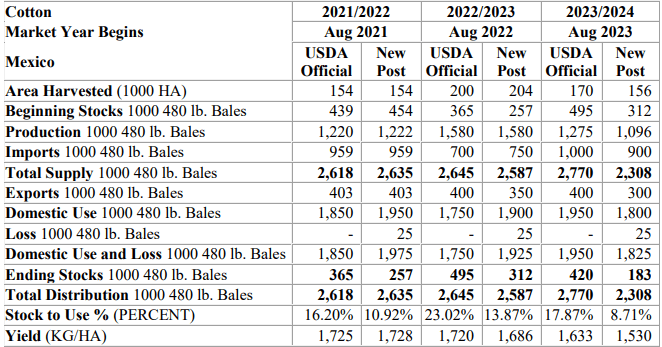The only GM cotton seeds allowed in Mexico are obsolete varieties and mostly unavailable on the world market, according to a report by the United States Department of Agriculture (USDA).
According to cotton producers, ginning companies and government officials from the Ministry of Agriculture and Rural Development (Sader), the Ministry of Environment and Natural Resources (Semarnat) will soon approve new cotton seed varieties.
However, these sources claim that the new varieties are seven to 10 years old, which will not help increase production yields.
Mexico: Cotton Production, Supply and Distribution
In Mexico, the planted area and yields are limited by restricted access to innovative seed technologies and high input costs.
Additionally, the Mexican government has not granted any permits for GM cotton planting since 2019.
GM cotton seeds
The government also imposed restrictions on glyphosate imports through the February 2023 Corn Decree, which mandates phasing out the use of glyphosate by 2024.
To overcome production challenges, some cotton growers have invested in new irrigation systems that are more efficient in their use of water and fertilizer.
Some cotton growers are addressing production challenges by investing in new irrigation systems that are more efficient in their use of water and fertilizer.
However, these systems are costly and vulnerable to damage from frequent power outages.
Even with financing from ginning companies, producers lack a real incentive to continue investing, considering other yield limitations, such as drought conditions and limited access to new seed varieties.
Investments in more efficient machinery and expanded mill capacity could help the Mexican textile industry adapt and respond quickly if consumer demand rises.
The USDA projects that U.S. cotton will meet 100% of Mexico’s textile import needs. This is driven by factors such as quality, consistency, preferential trade terms, and logistical proximity.
According to U.S. government projections, cotton imports for the 2023/24 season will total 900,000 bales. This represents a 20% increase compared to the previous year, due to lower expected production.

